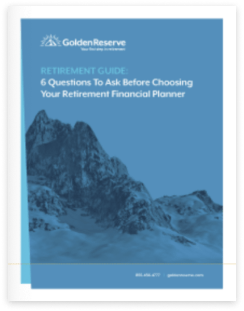Debunking the Retirement Myth: You Don’t Need 2 Million Dollars
Feeling that nagging doubt about your retirement savings? You’re not alone. A recent study found just 49%…
Golden Reserve

“Set it and forget it,” is the financial industry’s refrain for retirement success; as in, invest in mutual funds, don’t touch the money, and let the magic of compound interest carry you to the retirement of your dreams. There’s just one problem: what if what you’re “forgetting” is how much those mutual funds could cost you over time? A quick history lesson shows us why this is problematic.
What a Coincidence!
It might be hard to believe this, but there was a time when mutual funds weren’t regarded as the retirement savings vehicle for the masses. In fact, the first modern mutual fund debuted in 1924, long before Vanguard founder Jack Bogle or the 401k. It was only within recent history that mutual funds and retirement success became unquestionably intertwined. Case in point…
In 1978, the mutual fund industry was worth $56 billion. By the early 1990s, the number totaled just under $1 trillion, climbing to $7 trillion by the end of the decade. If you’ve read Fire Your Financial Advisor, those dates might ring a bell, because:
Is it a coincidence the explosion in mutual fund popularity happens at the same time? Perhaps the better question is…
Who really benefitted?
Over the course of the 1990s, the number of mutual funds increased 168% to meet public demand. During that time, many funds “added share classes that offered investors alternative means of compensating sales professionals for advice and assistance,” according to the Investment Company Institute. That’s just a cute way of saying that mutual funds made it possible to charge different fees to retail investors than institutions, who use their purchasing power to access lower fees. Simply put, it’s another way for the retail financial advisors to make a buck.
Here’s Why That’s a Problem
Say you invested in your workplace retirement plan, where mutual funds did you right. You retire and it’s time to rollover your funds. So, you go see the retail financial advisor around the corner– they seem nice enough– and are steered toward an IRA. You sign a bunch of papers and skim the hard-to-understand jargon. Nothing will seem amiss, but you will inevitably have missed something: the fee disclosures buried in the jargon that are likely more than what you paid in your workplace plan, even if the funds are exactly the same. Remember those share classes we mentioned above? Yep, here they are, hiding in plain sight.
As a brief published last year by the Pew Charitable Data Trust noted, “Small differences in fees can lead to big losses; consumers could end up making decisions that chip away at their hard-earned savings.” In fact, Pew estimates retail investors who rolled over their employer plans into traditional IRAs (to the tune of over $516 billion) will see a combined reduction in savings of approximately $45.5 billion over the course of 25 years.
And that doesn’t even take into account what could be lost if those retirees remain invested in risky funds. One good dip in the market and their retirement is wiped out. So much for those mutual funds doing you right.
The Bottom Line
Nothing is unquestionable. Not even mutual funds.
As Mr. Bogle once said, “You get what you don’t pay for.” If you’re not sure how much of your money is lining your retail financial advisor’s pocket, perhaps it’s time to ask some questions. Our Fee Filter and Market Flashlight are the perfect place to start.

Share this article
Feeling that nagging doubt about your retirement savings? You’re not alone. A recent study found just 49%…
“When should you start taking Social Security?” ranks among the top questions researched by retirees. Social Security…
Retirement is a time to relax and enjoy the fruits of your labor. But how do you…
Ever wondered how much your financial advisor is really pocketing from your retirement nest egg? Are you…